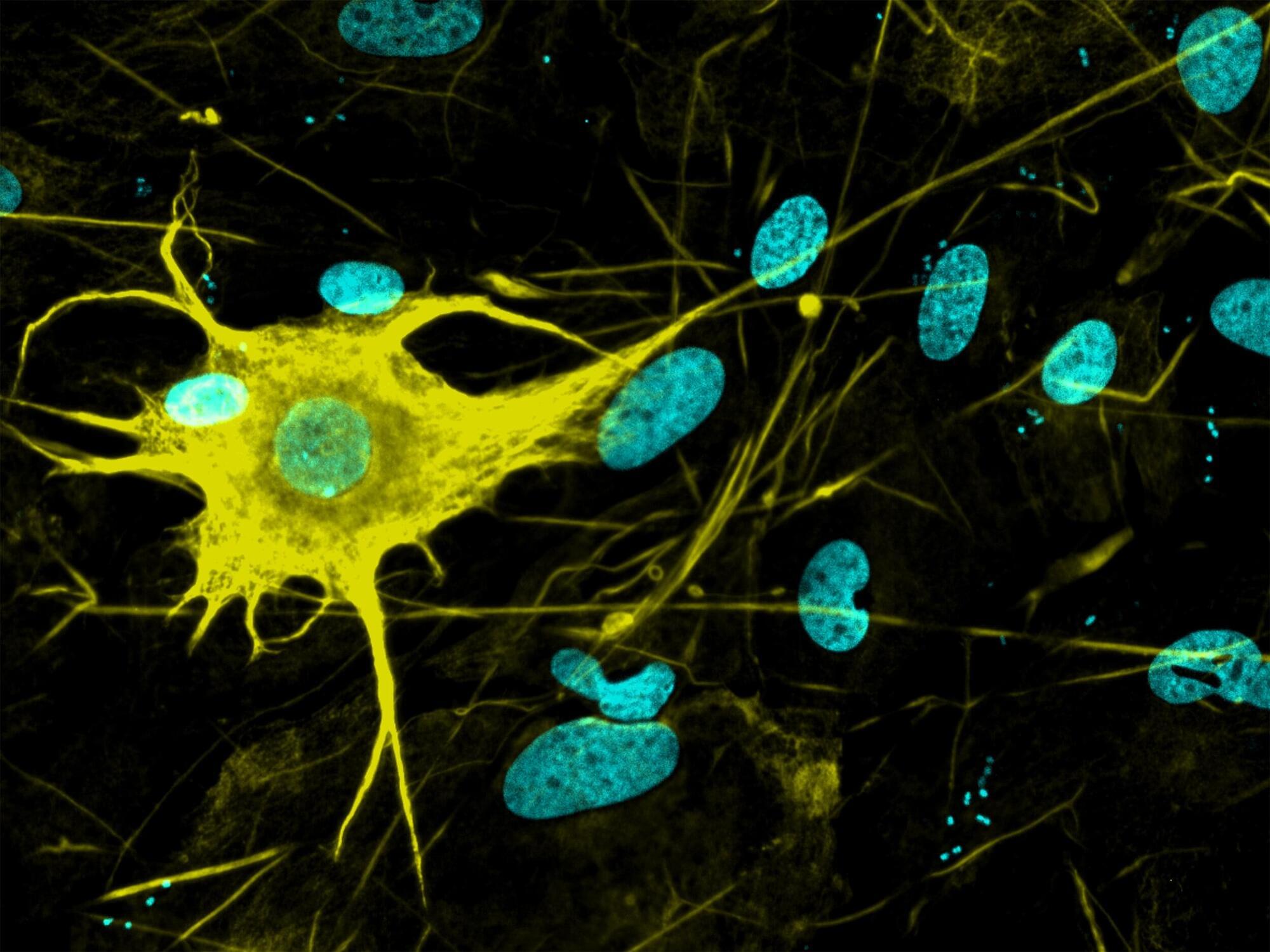Joscha Bach (Executive Director) and Lou de K (VP of Programs) interview our scientific advisor Michael Levin on how he would go about testing for consciousness.
Get the latest international news and world events from around the world.

Looking to study neurological conditions, researchers produce over 400 different types of nerve cells
Nerve cells are not just nerve cells. Depending on how finely we distinguish, there are several hundred to several thousand different types of nerve cells in the human brain, according to the latest calculations. These cell types vary in their function, in the number and length of their cellular appendages, and in their interconnections. They emit different neurotransmitters into our synapses, and depending on the region of the brain—for example, the cerebral cortex or the midbrain—different cell types are active.
When scientists produced nerve cells from stem cells in Petri dishes for their experiments in the past, it was not possible to take their vast diversity into account. Until now, researchers had only developed procedures for growing a few dozen different types of nerve cell in vitro. They achieved this using genetic engineering or by adding signaling molecules to activate particular cellular signaling pathways. However, they never got close to achieving the diversity of hundreds or thousands of different nerve cell types that actually exist.
“Neurons derived from stem cells are frequently used to study diseases. But up to now, researchers have often ignored which precise types of neuron they are working with,” says Barbara Treutlein, Professor at the Department of Biosystems Science and Engineering at ETH Zurich in Basel.


Illuminated sugars show how microbes eat the ocean’s carbon
A team of chemists, microbiologists and ecologists has designed a molecular probe (a molecule designed to detect proteins or DNA inside an organism, for example) that lights up when a sugar is consumed.
In the Journal of the American Chemical Society, they now describe how the probe helps researchers study the microscopic tug-of-war between algae and microbial degraders in the ocean.
“Sugars are ubiquitous in marine ecosystems, yet it’s still unclear whether or how microbes can degrade them all,” says Jan-Hendrik Hehemann from the Max Planck Institute for Marine Microbiology and the MARUM—Center for Marine Environmental Sciences, both located in Bremen.

Rewriting a scientific law to unlock the potential of energy, sensing and more
A research team from Penn State has broken a 165-year-old law of thermal radiation with unprecedented strength, setting the stage for more efficient energy harvesting, heat transfer and infrared sensing. Their results, currently available online, are slated to be published in Physical Review Letters on June 23.

New wearable device that mimics CT scans delivers continuous monitoring for heart and lung patients
Researchers have developed a first-of-its-kind wearable device capable of continuously scanning the lungs and heart of hospital patients while they rest in bed – offering a revolutionary alternative to CT scans.
The belt-like device, attached around a patient’s chest, uses ultrasound and works like a CT scanner. Rather than taking an isolated snapshot, it can produce a series of dynamic, high-resolution images of the heart, lungs and internal organs over time, giving doctors deeper insight into a patient’s condition. The device can be worn in bed and also reduces the need for repeated trips to radiology or exposure to doses of ionising radiation.
The breakthrough device has been developed at the University of Bath in collaboration with Polish technology company Netrix and is detailed in a recent publication in IEEE Transactions on Instrumentation and Measurement.
Groundbreaking sensor technology promises safer, real-time monitoring for hospitalised cardiothoracic patients.

Breakthrough by Shanghai doctors uses stem cells to cure diabetes
Doctors in Shanghai have, for the first time in the world, cured a patient’s diabetes through the transplantation of pancreatic cells derived from stem cells.
The 59-year-old man, who had Type 2 diabetes for 25 years, has been completely weaned off insulin for 33 months, Shanghai Changzheng Hospital announced on May 7.
A paper about the medical breakthrough, achieved after more than a decade of endeavor by a team of doctors at the hospital, was published on the website of the journal Cell Discovery on April 30.
It is the first reported instance in the world of a case of diabetes with severely impaired pancreatic islet function being cured via stem cell-derived autologous, regenerative islet transplantation, the hospital said. The most common pancreatic islet cells produce insulin.
(Circa 2024)
Single Gene Reverses 13+ Years of Aging — Safer Than Yamanaka Factors
Scientists have discovered SB000, a single gene that reverses cellular aging by 13.6 years — matching or exceeding the rejuvenation power of the famous Yaman…

Alex M. Vikoulov
Big News! My New Audiobook The Intelligence Supernova is Now Live! 🎧 I’m thrilled to announce the release of the audiobook edition of The Intelligence Supernova: Essays on Cybernetic Transhumanism, the Simulation Singularity & the Syntellect Emergence. This project has been incredibly close to my heart—it dives deep into the unfolding convergence of advanced AI, consciousness, and our collective evolution beyond biology. In this book, I explore the concept of the “Intelligence Supernova”—a coming explosion of synthetic and post-biological intelligence that may soon give rise to a planetary-scale mind, the Syntellect. It’s a philosophical and scientific journey that challenges you to imagine what lies beyond the Technological Singularity: digital immortality, mind-uploading, the emergence of infomorphs, and the architecture of a conscious Universe. This audiobook is for futurists, technophilosophers, and all curious minds ready to glimpse humanity’s metamorphic future. If you’re drawn to ideas like cybernetic immortality, experiential realism, or the Omega Point Cosmology, I think you’ll find this work especially meaningful.
Now available on Amazon: Audible: https://www.audible.com/pd/The-Intelligence-Supernova-Audiobook/B0FGZ3JMPM #IntelligenceSupernova #CyberneticTranshumanism #SimulationSingularity #SyntellectEmergence #SyntellectHypothesis #cybernetics #singularity #transhumanism #posthumanism #AGI #superintelligence
Amazon.com: The Intelligence Supernova: Essays on Cybernetic Transhumanism, The Simulation Singularity & The Syntellect Emergence (Audible Audio Edition): Alex M. Vikoulov, Ecstadelic Media Group, Virtual Voice: Books.
Andrew Ng: Building Faster with AI
Andrew Ng on June 17, 2025 at AI Startup School in San Francisco.
Andrew Ng has helped shape some of the most influential movements in modern AI—from online education to deep learning to AI entrepreneurship.
In this talk, he shares what he’s learning now: why execution speed matters more than ever, how agentic workflows are changing what startups can build, and why concreteness beats vagueness when turning ideas into products. He reflects on the rise of AI coding assistants, the shifting bottlenecks in product development, and why, despite faster software, it’s still human judgment and responsibility that will shape what comes next.
Apply to Y Combinator: https://ycombinator.com/apply.
Work at a startup: https:/workatastartup.com.
Chapters:
00:00 — Introduction.
00:31 — The Importance of Speed in Startups.
01:13 — Opportunities in the AI Stack.
02:06 — The Rise of Agent AI
04:52 — Concrete Ideas for Faster Execution.
08:56 — Rapid Prototyping and Engineering.
17:06 — The Role of Product Management.
21:23 — The Value of Understanding AI
22:33 — Technical Decisions in AI Development.
23:26 — Leveraging Gen AI Tools for Startups.
24:05 — Building with AI Building Blocks.
25:26 — The Importance of Speed in Startups.
26:41 — Addressing AI Hype and Misconceptions.
37:35 — AI in Education: Current Trends and Future Directions.
39:33 — Balancing AI Innovation with Ethical Considerations.
41:27 — Protecting Open Source and the Future of AI.